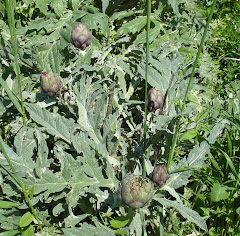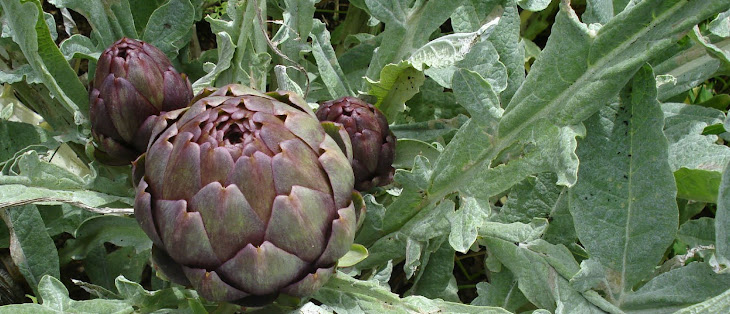I was sitting in the garden at midday, in the shade but looking out at a perfect late summer day with a cloudless sky and a cooling north wind, contented with what we have there. Lo Jardinièr was lighting the barbecue, I was preparing freshly picked vegetables for him to grill. As I sliced aubergine and pepper and wrapped goats' cheese in vine leaves, I started to think about what we are doing in our garden. I suppose you might call it our philosophy - the ideas and aims which run through our life and our gardening. These can be summed up in answers to the questions 'Why do we garden?' and 'How do we garden?'
palm
1. Enjoyment
This is the most important. We love being in our garden. We enjoy working in it and, even more, we enjoy relaxing in it. We're lucky that we live in a place where the sun shines for 300 days of the year (although it seems a bit less this year) and where we have days throughout the year when we can sit in the sun in the garden. We enjoy cooking and eating there, entertaining our friends and family or simply being on our own there. We love good food and for us the best thing about having the garden is growing our own delicious food - we like it when there is as short a time as possible between harvesting, cooking and eating - preferably just a few minutes.

rose
2. Organic gardening
We believe that vegetables taste best when they are grown organically and that all our food should be as natural as possible. We add compost and manure to the soil to improve it. We use no chemical pesticides or herbicides, only occasional applications of Bordeaux mixture, which is acceptable in organic gardening, and soapy water against black fly and other insects when absolutely necessary.

oleander
3. Gardening with the environment
We are trying to grow plants and varieties which are suited to the climate here. Vegetables will always need a lot of water, but we are trying to ensure that all our ornamental plants are drought-resistant, once they are established. This means watering new plants for the first year or so but after that they survive on their own. The plants that grow well here include cistus, oleander, aloe vera, prickly pear and palm. We have planted an apricot tree and two olive trees which need watering only in extreme drought conditions.

aloe vera
4. Conservation of water and other resources
We are trying to water the vegetables as efficiently as possible and we have installed drip-feed systems and the terracotta pot system in order to save water. We also save water used for washing vegetables, etc. to use in the garden. As far as the global environment is concerned, we try to damage the planet as little as possible. We don't fly, ever. We have a small car and don't travel far in it. We go on holiday by train.
5. Eating local food
We try to eat only food from our garden or from within a 100-kilometre radius of Gabian. We buy almost all the food that we don't grow ourselves in Gabian, in local shops and in the market, and we buy local wine (this is easy since it grows all around us!). The only food items which travel any distance to get to us are coffee and the Spanish olive oil which we use for cooking. And very, very occasionally we eat steak. When we eat meat, like most people here, we usually have pork or chicken, reared fairly locally and which, I read in the Guardian today, take less water to produce than cheese.
6. Community
When we bought our garden we found ourselves part of a community of gardeners, many of whom had inherited their plots from their parents. We're lucky to have their advice about gardening here and we enjoy sharing ideas, plants and produce with them and our other friends in the village and the surrounding area. And since beginning this blog earlier this year I've found people all over the world with similar ideas to ours and we've become part of that community too.
7. Living with the land
This really sums up all of the above, as well as many of our other beliefs. People who have lived here all their lives have a special relationship with the land, its produce and the landscape, which goes deeper than the surface beauty. The Mediterranean offers an environment which provides all human needs, so long as it is treated well in return. We're newcomers here, but we try to value its harshness, its dryness and its occasional extremes of heat and cold - to live with the land rather than work against it.
 olive
olive











7 comments:
Bonjour,
J'ai une devinette et une surprise pour toi sur mon blog...
Bonne journee !
Lovely, Teleri, and the day of my visit comes closer every day.
What a thoughtful post. It's the connection with the land and nature that keeps me gardening. And the connection with the seasons.
Hi Teleri, a very nice piece, I'd say lovely, but Kate got there first....It has made me look at myself and answer the same questions....
What a lovely, thought-provoking post. I feel regretful and guilty for not being able to grow my own vegetables, but at the same time I'm totally delighted that you do & grateful that I can take vicarious pleasure in reading about your experiences.
/krys
I wholeheartedly agree with you about using locally grown produce. I always try to do this but it's not easy living in London. My opinion about the power of the big supermarkets cannot be printed! they are responsible for British farmers going out of business all round the country.
An absolutely insightful and pleasurable post to read. I am still in the beginning stages of gardening, but I do believe that regarding ornamentals, you should grow what will eventually survive on their own...hence my eagerness to grow edelweiss! With the cool mountain climate/higher altitude where we're at, I am certain that they will survive among the rocks that we have in the garden.
Thank you for stopping by! When I read that you were blogging from the Languedoc I was instantly hooked. It's been awhile since we've made a trip to France (the long drive making it less possible) and I am envious that you are harvesting tomatoes. We are still waiting for ours as its been too cool this summer.
Post a Comment